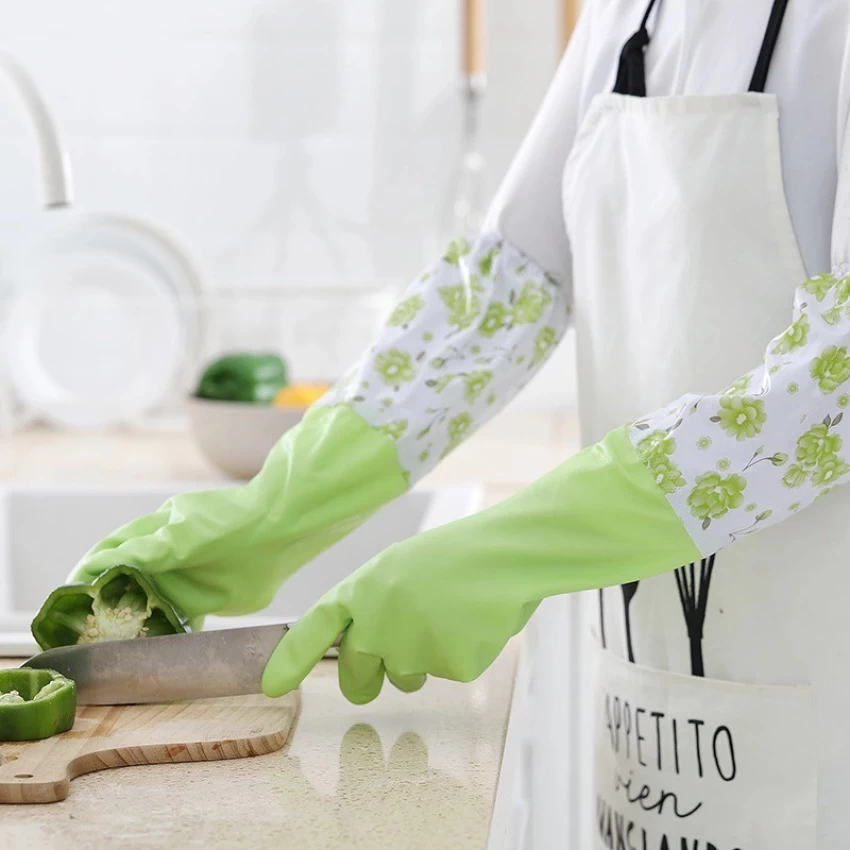
These are gloves that work, gloves that bend easily, gloves that can be worn over and over without breaking, and above all else, gloves that don’t let you down: they will protect you from practically any chemical you may come across, and most temperatures. The ideal pair of kitchen gloves.
These latex-free disposable gloves, wearing spikes on the hand; the previous model had smooth finger tips. I could get them on and off faster than nitrile gloves, with good dexterity, and they were much more comfortable.
Comfort
It’s important to pay close attention to this factor, because the tactile feel of the glove is one you’ll experience every time you use it. Assume that the gloves you’re looking at are either the same length or can be adjusted to fit your hand. The ideal comfortable fit should be neither tight nor loose; neither too bunch up nor slide off the hand. If a glove is so tight that it is uncomfortable or even restrictive when worn, your dexterity will suffer. However, if it’s too loose, it will slide and get in your way.
These are padded using soft latex that moulds to your hand and gives awesome tactility. Absorbent inner lining sweats up the dirt to keep hands clean – great for a long session of cleaning!
Powder free, thin but durable, chlorinated, and 3.5 mil thick; this is a great, dependable leather glove that is a safe choice for direct, bare-handed contact with typical food allergens and other chemicals found in the average restaurant environment. A high-quality option for exceeding the standards of cleanliness that a deli job would normally require, such as wrapping sandwiches or already prepared foods, these gloves are also a good choice for more customer-facing roles like taking orders or serving drinks. Together and interchangeable, they represent the perfect starter set for a restaurant-oriented environment.
Dexterity
These “kitchen gloves” guards are voluntarily worn by a food service-worker to protect their hands from bacteria, germ, or contaminations, to reduce the risk of cross-contamination. This can help to reduce the risk of you becoming sick.
Moreover, these gloves can also help you to work with food more safe and effective way. Due to the good non-slip characteristics, they can let you control your utensils more easily.
You can see, touch and feel with nitrile gloves like any other kind without any loss of grip, but they’re also oil- and fat-resistant, and so, unlike vinyl, resistant to puncturing or tearing.
Elasticated nitrile gloves are a thin, easy to wear a rubber glove with excellent heat resistance popular amongst professional cleaners for general cleaning.
However, they are not ideal for heavy duty cleaning: easily torn, they don’t have a cuff which helps keep water from running down the arm, and as gloves go are among the most expensive options on the market.
Durability
Gloves are a useful tool in restaurants to reduce foodborne illness. Amid all these dishes, it’s easy for a chef to forget about mindfully switching gloves – and for hands to transfer pathogen-dotted fingers from glove to glove, and then on to food items.
Reusable gloves can also transform messy jobs into less messy and safer exercises – think about the countless occasions that people working in delis or bakeries have to swap out contaminated gloves.
Latex and nitrile, or even a synthetic glove, will go on snug and keep out oil and chemicals. For greater comfort and looser fit, go to stretch poly or vinyl: both will serve you well for kitchen tasks, just as for dishwashing. Neoprene gloves are hard-wearing and comfortable to wear over time; they can be replaced after kitchen catharsis.
Easy-to-clean
Gloves used by food prep staff in the kitchen would help to keep them from coming into contact with their hands and bare skin, and help to minimize direct contact with contaminated foods so as to reduce the spread of illness-causing bacteria and germs such as foodborne illness.
Gloves should be made easily washable. In many instances, the gloves should be designed to allow them to be rinsed or washed after each use (and then left to air-dry) before reuse or allow another task to use different gloves – so that this can help protect against cross-contamination to different surfaces.
Some are more resistant to certain products than others, so restaurants, delis and food establishments in general – as well as dry cleaners and healthcare centres – benefit from using trusted pairs when handling food products. Nitrile gloves are an ideal alternative for those with latex allergies: as comfortable on the hands as its predecessors, and just as puncture resistant and chemical-proof.






